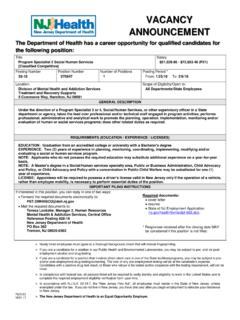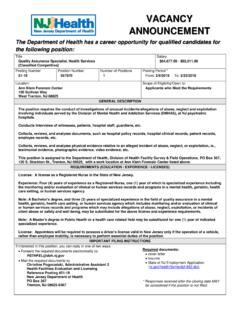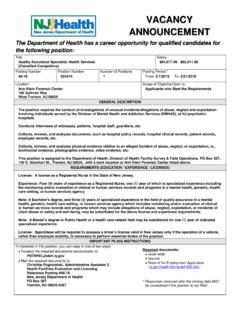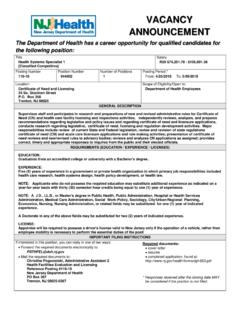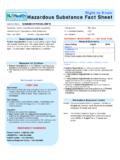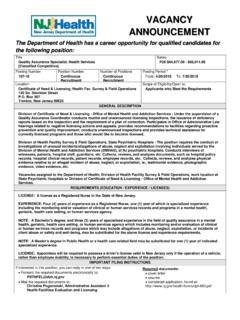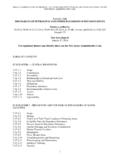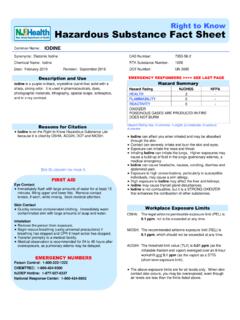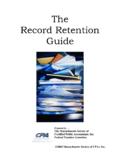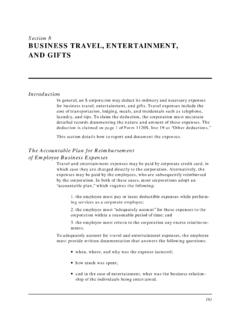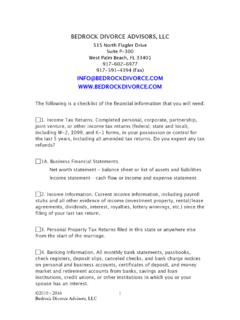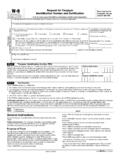Transcription of PLAIN LANGUAGE GUIDE TO NEW JERSEY’S EXECUTIVE …
1 PLAIN LANGUAGE GUIDE TO. NEW jersey 'S EXECUTIVE branch . ethics standards . Revised June 2014. TABLE OF CONTENTS. INTRODUCTION .. 3. PRINCIPALS OF ETHICAL CONDUCT .. 3. GENERAL standards OF 4. GIFTS, FAVORS, SERVICES AND OTHER THINGS OF VALUE .. 5. COMPENSATION FOR OFFICIAL DUTIES .. 5. ATTENDANCE AT EVENTS: HONORARIA, ACTIVITIES AND EXPENSES ..5. POLITICAL ACTIVITY ..8. OUTSIDE EMPLOYMENT/ACTIVITIES .. 9. CONFLICTS OF INTEREST .. 10. RULES REGARDING PUBLISHED WORKS .. 11. CONFIDENTIAL INFORMATION .. 12. USE OF OFFICIAL STATIONERY .. 12. SEEKING FUTURE EMPLOYMENT/POST-EMPLOYMENT RESTRICTIONS.
2 13..13. RECUSAL ..14. FINANCIAL DISCLOSURE .. 15. THE COMMISSION ..15. COMPLAINTS AND INVESTIGATIONS .. 15. PENALTIES .. 16. ADVISORY OPINIONS .. 16. INFORMATION ON RELATED OFFICES .. 17. 2. INTRODUCTION. This is a GUIDE for State officers and employees and special State officers and employees in the EXECUTIVE branch of New jersey State Government. If you are one of these persons, you should read this GUIDE carefully. It explains the ethics rules and laws found in the New jersey Conflicts of Interest Law ( Conflicts Law ), 52:13D-12 et seq., and in the rules of the State ethics Commission, 19 et seq.
3 In addition to those laws and rules, you are also bound by the Uniform ethics Code and any supplemental ethics code adopted by the agency for which you work. You are responsible for knowing the laws and rules described in this GUIDE , as well as the specific policies and procedures of your particular agency. As we in State government do our work, it is important that the public have the highest degree of confidence in our conduct. Our fellow employees depend on us to make lawful, ethical decisions. This GUIDE provides general information on the minimum ethical standards and does not have the force and effect of law.
4 It does not replace any actual laws or rules, and it does not address every ethical restriction contained in the laws and rules it summarizes. It does not cover the requirements contained in your agency's supplemental ethics code, to which you are also subject if your agency has adopted such a code. Ethical issues may also be addressed in procurement, personnel, and travel rules, as well as in open meetings, open records, and criminal laws. The statutes creating your agency may also contain ethical prohibitions. In addition, members of particular professions (such as lawyers and accountants) are subject to their own codes of professional responsibility.
5 Information in this GUIDE derives from detailed statutes, regulations, and EXECUTIVE orders. There are, however, simple principles that will GUIDE you through the details. PRINCIPLES OF ETHICAL CONDUCT. Exploitation of Official Position. You may not use your position to secure a job, contract, governmental approval or special benefit for yourself, a friend or family member. Compensation for Official Duties. Your paycheck is your only permitted compensation. You may not accept any other compensation for performing your State job. Gifts and Favors. You may not accept any gift of more than nominal value related in any way to your official duties.
6 Attendance at Events: Honoraria, Activities, and Expenses. You may not be wined and dined by people with whom your agency conducts business. You may not accept honoraria. Official travel reimbursements require prior approval from your agency or the ethics Commission. Outside Employment, Business Interests and Political Activity. You must disclose to your agency any outside employment, business interests and political activities, compensated or uncompensated, in which you engage. You must obtain prior approval before commencing any secondary employment or business activity.
7 Conflicts of Interest. You may not act in any official matter in which you, your family, or your close friends have a direct or indirect personal or financial interest. Rather, you should recuse yourself and ask someone else to perform the State task. Prior Business Relationships. You may not have any involvement in official matters that involve any private sector individual or entity that employed you or did business with you during the one year prior to the commencement of your State employment. 3. Prohibition on Use of Confidential Information. You may not disclose confidential information acquired through your position to any unauthorized person.
8 Nepotism. You may not hire, promote, or supervise a relative. Post-Employment Lifetime Restrictions. After you leave public employment, you may not represent or assist a person concerning a particular matter if you were substantially and directly involved in that particular matter while in State employ. Further, you may not use or disclose any information not generally available to members of the public, gained during the course of your employment. When in Doubt, Ask! If you think you have a conflict of interest or are unsure of any of these rules, ask your ethics Liaison Officer ( ELO ) or the Commission.
9 If you suspect any wrongdoing, report your suspicion. Complaints may be made anonymously to the Commission and are kept confidential. If you have questions (and most of us do, from time to time), you should contact your supervisor, Department Head or ELO. Most of the reporting requirements discussed in this GUIDE refer you to your agency's ELO. A list of ELOs is available at You may also address questions directly to the State ethics Commission (which we refer to in this GUIDE as the Commission ). To obtain more information, call the Commission at (609) 292-1892 or 1-888-223-1355.
10 You may also visit our web site at GENERAL standards OF CONDUCT. These rules promote the principle that public office is a public trust. Where government is based upon the consent of its citizens, the public is entitled to have complete confidence in the integrity of government. The business of New jersey must be conducted in a manner intended to assure the citizens of our State that the character and conduct of its officials and employees are above reproach. To achieve this result, the State has ethics rules that are general in nature, as well as rules that deal with very specific situations.
